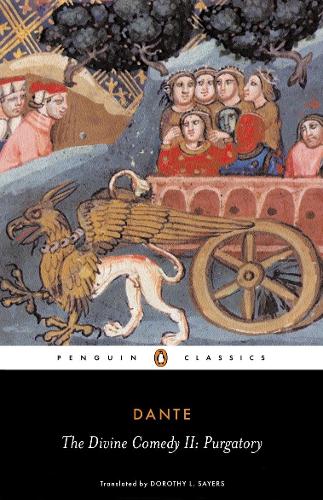
The Divine Comedy: Purgatory
(Paperback, 2nd edition)
Available Formats
Hardback
Published: 30th June 1995
Paperback
Published: 5th February 2009
Hardback
Published: 14th October 2025
Paperback
Published: 2nd July 2019
Leather / fine binding
Published: 21st October 2013
Hardback
Published: 1st March 2025
Paperback
Published: 31st December 1963
Paperback
Published: 1st May 1990
Paperback
Published: 1st May 1990
Paperback
Published: 29th May 1991
Paperback
Published: 29th May 1991
Paperback
Published: 11th November 1991
Paperback
Published: 11th November 1991
Paperback
Published: 30th November 2021
Paperback
Published: 24th April 2003
Paperback, 3rd edition
Published: 1st November 1986
Paperback, 2nd edition
Published: 1st July 1985
Paperback, 2nd edition
Published: 1st January 1964
Paperback
Published: 27th May 2003
Publishing Details
The Divine Comedy: Purgatory
By (Author) Dante Alighieri
Penguin Books Ltd
Penguin Classics
1st January 1964
26th August 2004
2nd edition
United Kingdom
Classifications
General
Non Fiction
851.1
Physical Properties
Paperback
400
Width 129mm, Height 198mm, Spine 17mm
280g
Description
Beginning with Dante's liberation from Hell, Purgatory relates his ascent, accompanied by Virgil, of the Mount of Purgatory a mountain of nine levels, formed from rock forced upwards when God threw Satan into depths of the earth. As he travels through the first seven levels, Dante observes the sinners who are waiting for their release into Paradise, and through these encounters he is himself transformed into a stronger and better man. For it is only when he has learned from each of these levels that he can ascend to the gateway to Heaven: the Garden of Eden. The second part of one of the greatest epic poems, Purgatory is an enthralling Christian allegory of sin, redemption and ultimate enlightenment.
Reviews
The English Dante of choice. Hugh Kenner
Exactly what we have waited for these years, a Dante with clarity, eloquence, terror, and profoundly moving depths. Robert Fagles, Princeton University
A marvel of fidelity to the original, of sobriety, and truly, of inspired poetry. Henri Peyre, Yale University
Author Bio
Date- 2013-08-06 Dante, or Durante deli Alighieri, was born in Florence, Italy, circa 1265. His family was connected with the Guelph political alliance, supporters of the Papacy. His mother died before Dante's tenth birthday. Dante himself was betrothed to Gemma di Manetto Donati when he was aged only 12. The pair went on to marry, but Dante's true love was for Beatrice Portinari, who would inspire much of his poetry. Dante and Gemma had several children. Dante was a member of Florence's Apothecaries' Guild, though he did not practice as a pharmacist. Allied to the White Guelphs, with whom he fought against the vanquishing Black Guelphs, he was eventually condemned to perpetual exile from Florence. He went first to Verona and then to Liguria. There is speculation that he travelled more widely, including to Paris and Oxford, although this has not been verified. During his time of exile Dante conceived and wrote the three poems which form The Divine Comedy. He died in 1321, aged 56, of suspected malaria. He was buried in Ravenna, Italy, where a tomb was later erected in his name. Stephen Wyatt is a playwright and dramatist with extensive experience in stage, radio and television. Dante Alighieri was born in Florence in 1265 and belonged to a noble but impoverished family. He followed a normal course of studies, possibly attending university in Bologna, and when he was about twenty he married Gemma Donati, by whom he had several children. He had first met Bice Portinati, whom he called Beatrice, in 1274, and when she died in 1290, he sought distraction by studying philosophy and theology and by writing La Vita Nuova. During this time he became involved in the strife between the Guelfs and the Ghibellines; he became a prominent White Guelf, and when the Black Guelfs came to power in 1302, Dante, during an absence from Florence, was condemned to exile. He took refuge first in Verona, and after wandering from place to place - as far as Paris and even, some have said, to Oxford - he settled in Ravenna. While there he completed The Divine Comedy, which he began in about 1308. Dante died in Ravenna in 1321.
